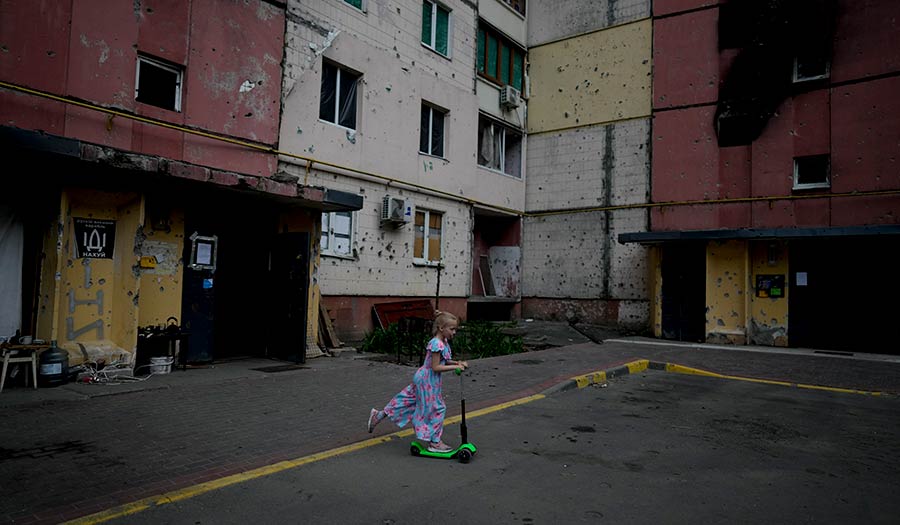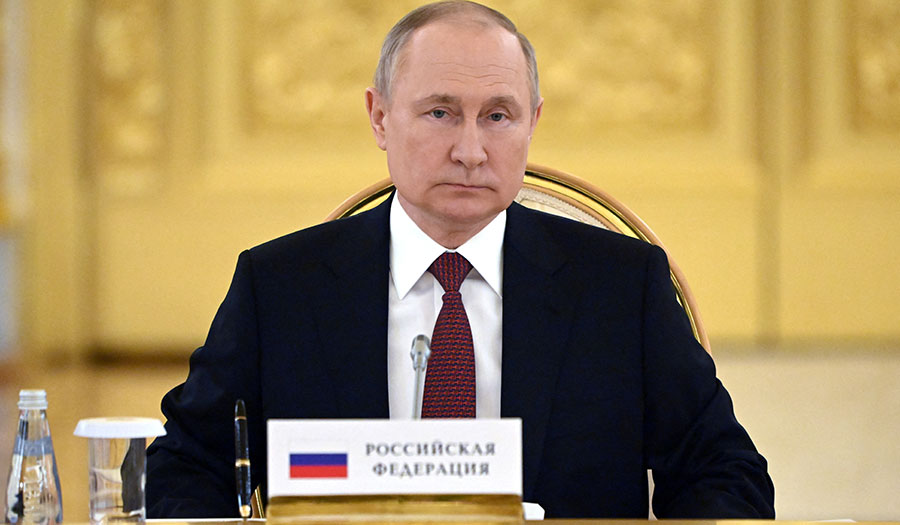 AP/Natacha Pisarenko
AP/Natacha Pisarenko
World News Desk
Learn the why behind the headlines.
Subscribe to the Real Truth for FREE news and analysis.
Subscribe NowThe Associated Press – When Vladimir Putin sent troops into Ukraine in late February, the Russian president vowed his forces would not occupy the country. But as the invasion reached its 100th day Friday, Moscow seemed increasingly unlikely to relinquish the territory it has taken in the war.
The ruble is now an official currency in the southern Kherson region, alongside the Ukrainian hryvnia. Residents there and in Russia-controlled parts of the Zaporizhzhia region are being offered expedited Russian passports. The Kremlin-installed administrations in both regions have talked about plans to become part of Russia.
The Moscow-backed leaders of separatist areas in eastern Ukraine’s Donbas region, which is mostly Russian-speaking, have expressed similar intentions. Mr. Putin recognized the separatists’ self-proclaimed republics as independent two days before launching the invasion, and fierce fighting has been underway in the east for weeks as Russia seeks to “liberate” all of the Donbas.
The Kremlin has largely kept mum about its plans for the cities, towns and villages it has bombarded, encircled and finally captured. Kremlin spokesman Dmitry Peskov has said it will be up to the people living in seized areas to decide their status.
Ukrainian President Volodymyr Zelenskyy said this week that enemy forces now control almost one-fifth of the country’s territory. But in a video message marking the war’s first 100 days, he made it clear Ukraine will not submit easily.
“We have defended Ukraine for 100 days already. Victory will be ours,” he said.
Initially, at least, annexing more land from Ukraine was not believed to be the main goal of the invasion. It was widely thought that the Kremlin intended to install a pro-Moscow government in Kyiv that would prevent Ukraine from joining NATO and pulling further away from Russia’s influence.
But now, Moscow is unlikely to let go of its military gains, according to political analysts.
“Of course [Russia] intends to stay,” said Andrei Kolesnikov, senior fellow at the Carnegie Endowment for International Peace. To Russia, “it’s a pity to give away what has been occupied, even if it was not part of the original plan.”
Russian forces captured much of Kherson and neighboring Zaporizhzhia early in the war, gaining control over most of Ukraine’s Sea of Azov coast and securing a partial land corridor to the Crimean Peninsula, which Russia annexed from Ukraine in 2014. They completed the takeover last month with the capture of the port city of Mariupol following a three-month siege.
Residents of the cities of Kherson and Melitopol took to the streets to protest the occupation, facing off with Russian soldiers in plazas. Ukrainian officials warned that Russia might stage a referendum in Kherson to declare the region an independent state.
But some in captured areas of Ukraine have welcomed a Russian takeover.
“I’ve wanted to live in Russia since I was little, and now I realize I don’t even have to move anywhere,” said Vadim Romanova, a 17-year-old from Mariupol.
In Russian-occupied cities in southern Ukraine, people with pro-Kremlin views replaced mayors and other local leaders who disappeared in what Ukrainian officials and media said were kidnappings. Russian flags were raised, and Russian state broadcasts that promoted the Kremlin’s version of the invasion supplanted Ukrainian TV channels.
The Russian ruble was introduced as the second official currency in both the Kherson and Zaporizhzhia regions—at least in the parts under Russian control—and pro-Russian administrations started offering a “one-time social payment” of 10,000 rubles (roughly $163) to local residents.
An office of Russia’s migration services opened in Melitopol, taking applications for Russian citizenship from residents of the captured southern regions through a fast-track procedure. The procedure was first implemented in 2019 in the rebel-controlled areas of the Donbas, where more than 700,000 people have received Russian passports.
Top Russian officials started touring the regions, touting the territories’ prospects for being integrated into Russia. Deputy Prime Minister Marat Khusnullin visited Kherson and Zaporizhzhia in mid-May and indicated they could become part of “our Russian family.”
A senior official in the Kremlin’s ruling United Russia party, Andrei Turchak, put it even more bluntly in a meeting with residents of Kherson: “Russia is here forever.”
Members of the pro-Kremlin administrations in both regions soon announced that the areas would seek to be incorporated into Russia. While it remains unclear when or if it will happen, Russia appears to be digging in.
Oleg Kryuchkov, an official in Russia-annexed Crimea, said this week that the two southern regions have switched to Russian internet providers. State media ran footage of people lining up to get Russian SIM cards for their cellphones. Mr. Kryuchkov also said that both regions are switching to the Russian country code, +7, from the Ukrainian +380.
Senior Russian lawmaker Leonid Slutsky, a member of the Russian delegation in stalled peace talks with Ukraine, said that referendums on joining Russia could take place in the Donbas, Kherson and Zaporizhzhia regions as early as July.
Ukrainian experts say it will not be easy for the Kremlin to rally genuine support in Ukraine’s south.
Volodymyr Fesenko, of the Kyiv-based Penta Center think tank, said most residents of the southern regions identify as Ukrainians much more strongly than the people in areas that are closer to Russia or have been led by the Moscow-backed separatists for the past eight years.
- World News Desk
- EUROPE
 Russia Uses New Laser Weapons in Ukraine
Russia Uses New Laser Weapons in Ukraine
Other Related Items:
- 1.1 Million Afghan Children Could Face Severe Malnutrition
- Mass Shootings: An American Epidemic
- Pathogens Jumping from Animals to Humans Becoming More Frequent


